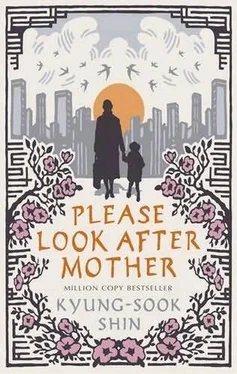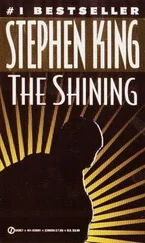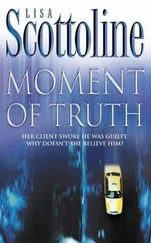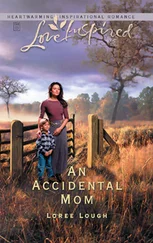You come out of the bathroom and sit down with the group. Instead of putting the earphones in your ears, however, you take out your sister’s letter, hold it for a moment, then rip the envelope open.
Sister .
When I went to Mom’s soon after coming back from America, she gave me a young persimmon tree that came up to my knees. It was when I went to get the things I’d left there. Mom was crumpled in the storage area next to the shed, where my cooktop stove and fridge and table were stored. She was lying there, her limbs limp. The neighborhood cats that Mom fed were sitting around her. When I shook her, she managed to open her eyes, as if she were waking up, and looked at me and smiled. She said, “You’re here, my baby daughter!” Mom told me she was fine. Now I see that she had lost consciousness, but she insisted that she was fine, that she was in the storage shed to feed the cats. Mom had kept everything I left there when I went to America. Even the rubber gloves I told her to use as I was leaving. She said that she almost used the portable gas range during one ancestral rite but then didn’t. “Why not?” I asked, and she said, “So I could give everything back to you the way you left it when you came home.”
When I finished loading all the things onto the truck, Mom came over with the persimmon tree from behind the house, where she kept all the condiment jars. She looked embarrassed. The roots of the tree were wrapped in dirt and plastic. She had bought it for the yard at our new place. It was so small that I wondered when it would start bearing fruit. Honestly, I didn’t want to bring it back. We were going to live in a house with a yard, but we didn’t own it, and I wondered who would take care of the tree. Mom, seeing through me, said, “You’ll find persimmons on this tree very soon; even seventy years go by quick.”
I still didn’t want to take it, but Mom said, “It’s so when I die you can pick persimmons and think about me.”
Mom started saying “When I die…” more frequently. You know, that was her weapon for a long time. Her only weapon when it came to kids who didn’t do things the way she wanted them to. I don’t know when it started, but when she didn’t approve of something, Mom would say, “Do that after I die.” I brought the little persimmon tree to Seoul on the truck, although I didn’t know if it would survive, and buried the roots in the ground, as deep as Mom had marked on the tree. Later, when Mom came to Seoul, she said I’d planted it too close to the wall and that I should move it to another spot. She asked me often if I’d moved it. I said yes, even though I hadn’t. Mom wanted me to move the tree to an empty spot in the yard where I thought I could plant a big tree if I had enough money to buy this house. I didn’t really think I would move the little tree, which only had a couple of branches and now barely came up to my waist, but I answered yes. Before she went missing, she suddenly started calling every other day, asking, “Did you move the persimmon tree?” I just said, “I’ll do it later.”
Sister. Not until yesterday, with the baby on my back, did I take a cab to So-orung and buy powdered chicken droppings, dig a hole on the spot Mom had pointed out, and move the persimmon tree there. I hadn’t felt at all bad when I didn’t listen to her and failed to move that tiny persimmon tree away from the wall, but now I was surprised. When I first brought the tree here, the roots were so scrawny that I kept looking at it, doubting that it could even grow in the ground, but when I dug it up to move it, its roots had already spread far underground, tangled. I was impressed with its grit for life, its determination to survive somehow in the barren earth. Did she mean to give me the tree so that I could watch its branches multiply and its trunk thicken? Was it to tell me that if I wanted to see fruit I had to take good care of it? Or maybe she just didn’t have money to buy a big tree. For the first time, I felt attached to that persimmon tree. My doubts that it could ever have fruit disappeared .
Do you remember asking me a while ago to tell you something that only I knew about Mom? I told you I didn’t know Mom. All I knew was that Mom was missing. It’s the same now. I especially don’t know where her strength came from. Think about it. Mom did things that one person couldn’t do by herself. I think that’s why she became emptier and emptier. Finally, she became someone who couldn’t find any of her kids’ houses. I don’t recognize myself, feeding my kids and brushing their hair and sending them to school, unable to go look for Mom even though she’s missing. You said I was different, unlike other young moms these days, that there was a small part of me that’s a little bit like her, but, sister, no matter what, I don’t think I can be like Mom. Since she went missing, I often think: Was I a good daughter? Could I do the kind of things for my kids she did for me?
I know one thing. I can’t do it like she did. Even if I wanted to . When I’m feeding my kids, I often feel annoyed, burdened, as if they’re holding on to my ankles. I love my kids, and I am moved-wondering, did I really give birth to them? But I can’t give them my entire life like Mom did. Depending on the situation, I act as if I would give them my eyes if they need them, but I’m not Mom. I keep wishing the baby would hurry and grow up. I feel that my life has stalled because of the kids. Once the baby’s a little older, I’m going to send him to day care, or find someone to sit with him, and go to work. That’s what I’m going to do. Because I have my life, too. When I realized this about myself, I wondered how Mom did it the way she did, and discovered that I didn’t really know her. Even if we say her situation made her think only about us, how could we have thought of Mom as Mom her entire life? Even though I’m a mother, I have so many dreams of my own, and I remember things from my childhood, from when I was a girl and a young woman, and I haven’t forgotten a thing. So why did we think of Mom as a mom from the very beginning? She didn’t have the opportunity to pursue her dreams and, all by herself, faced everything the era dealt her, poverty and sadness, and she couldn’t do anything about her very bad lot in life other than suffer through it and get beyond it and live her life to the very best of her ability, giving her body and her heart to it completely. Why did I never give a thought to Mom’s dreams?
Sister .
I wanted to shove my face into the hole I dug for the persimmon tree. If I can’t live like Mom, how could she have wanted to live like that? Why did this thought never occur to me when she was with us? Even though I’m her daughter, I had no idea, so how alone must she have felt with other people? How unfair is it that all she did was sacrifice everything for us, and she wasn’t understood by anyone?
Sister. Do you think we’ll be able to be with her again, even if it’s just for one day? Do you think I’ll be given the time to understand Mom and hear her stories and console her for her old dreams that are buried somewhere in the pages of time? If I’m given even a few hours, I’m going to tell her that I love all the things she did, that I love Mom, who was able to do all of that, that I love Mom’s life, which nobody remembers. That I respect her .
Sister, please don’t give up on Mom, please find Mom .
Your sister must not have been able to write the date or a goodbye. The letter has round blotches on it, as if she’d been crying as she wrote it. Your eyes linger over the yellowed spots; then you fold the letter and put it back in your purse. As your sister was writing the letter, her youngest, who had probably been eating something off the floor under the table, may have come to her and clumsily started to sing the children’s song that starts, “Mommy Bear…,” hanging on to her. Your sister may have looked at her baby, although with a dark expression, and sung for him, “… is slim!” The baby, who would not have understood his mom’s emotions, may have grinned broadly, and said “Daddy Bear…,” waiting for your sister to finish the verse. Your sister may have finished it, “is fat!” Your sister may not have been able to write the end to her letter. The baby, trying to climb up your sister’s leg, may have fallen down, bumping his head on the floor. And the baby would have burst into desperate-sounding sobs. Your sister, seeing the bluish bruise spreading on the baby’s soft skin, may have then spilled the tears she had been holding back.
Читать дальше











